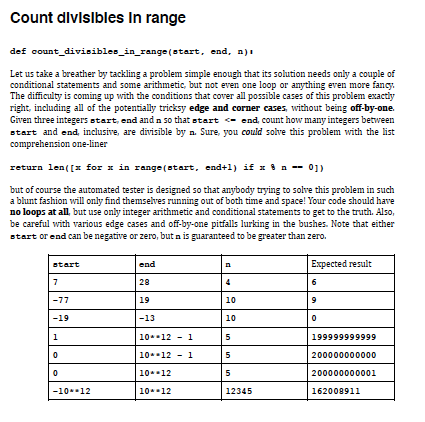Count divislbles In range def count_divisibles_in_range (start, end, a) Let us take a breather by tackling a problem simple enough that its solution needs only a couple of conditional statements and some arithmetic, but not even one loop or anything even more fancy. The difficulty is coming up with the conditions that cover all possible cases of this problem exxactly right, including all of the potentially tricksy edge and corner cases, without being off-by-one. Given three integers start, end and a so that start - end count how many integers between start and end inclusive, are divisīble by a. Sure, you could solve this problem with the list comprehension one-liner retura len([= for x in range (start, end+l) if x a-- 01) but of course the automated tester is designed so that anybody trying to solve this problem in such a blunt fashion will only find themselves running out of both time and space! Your code should have no loops at all but use only integer arithmetic and conditional statements to get to the truth. Also, be careful with various edge cases and off-by-one pitfalls lurking in the bushes. Note that either start or end can be negative or zero, but a is guaranteed to be greater than zero. start end Expected result 28 -77 19 10 -19 -13 10 1 10.12 - 1 199999999999 10.12 - 1 5 200000000000 10.-12 200000000001 -10.12 10.12 12345 162008911 un
Count divislbles In range def count_divisibles_in_range (start, end, a) Let us take a breather by tackling a problem simple enough that its solution needs only a couple of conditional statements and some arithmetic, but not even one loop or anything even more fancy. The difficulty is coming up with the conditions that cover all possible cases of this problem exxactly right, including all of the potentially tricksy edge and corner cases, without being off-by-one. Given three integers start, end and a so that start - end count how many integers between start and end inclusive, are divisīble by a. Sure, you could solve this problem with the list comprehension one-liner retura len([= for x in range (start, end+l) if x a-- 01) but of course the automated tester is designed so that anybody trying to solve this problem in such a blunt fashion will only find themselves running out of both time and space! Your code should have no loops at all but use only integer arithmetic and conditional statements to get to the truth. Also, be careful with various edge cases and off-by-one pitfalls lurking in the bushes. Note that either start or end can be negative or zero, but a is guaranteed to be greater than zero. start end Expected result 28 -77 19 10 -19 -13 10 1 10.12 - 1 199999999999 10.12 - 1 5 200000000000 10.-12 200000000001 -10.12 10.12 12345 162008911 un
Database System Concepts
7th Edition
ISBN:9780078022159
Author:Abraham Silberschatz Professor, Henry F. Korth, S. Sudarshan
Publisher:Abraham Silberschatz Professor, Henry F. Korth, S. Sudarshan
Chapter1: Introduction
Section: Chapter Questions
Problem 1PE
Related questions
Question
please help solve the python

Transcribed Image Text:Count dlvislbles In range
def count_divisibles_in_range (start, end, n)i
Let us take a breather by tackling a problem simple enough that its solution needs only a couple of
conditional statements and some arithmetic, but not even one loop or anything even more fancy.
The difficulty is coming up with the conditions that cover all possible cases of this problem exactiy
right, including all of the potentially tricksy edge and corner cases, without being off-by-one.
Given three integers start, end andn so that start - end, count how many integers between
start and end, inclusive, are divisīble by n. Sure, you could solve this problem with the list
comprehension one-liner
return len( [x for 1 in range (start, end+1) if x 8 n -- 01)
but of course the automated tester is designed so that anybody trying to solve this problem in such
a blunt fashion will only find themselves running out of both time and space! Your code should have
no loops at all, but use only integer arithmetic and conditional statements to get to the truth. Also,
be careful with various edge cases and off-by-one pitfalls lurking in the bushes. Note that either
start or end can be negative or zero, but a is guaranteed to be greater than zero.
end
Expected result
start
28
6
-77
19
10
-19
-13
10
1
10.-12
1
5
199999999999
10*12
1
5
200000000000
10*12
5
200000000001
-1012
10.12
12345
162008911
Expert Solution
This question has been solved!
Explore an expertly crafted, step-by-step solution for a thorough understanding of key concepts.
Step by step
Solved in 2 steps with 1 images

Knowledge Booster
Learn more about
Need a deep-dive on the concept behind this application? Look no further. Learn more about this topic, computer-science and related others by exploring similar questions and additional content below.Recommended textbooks for you

Database System Concepts
Computer Science
ISBN:
9780078022159
Author:
Abraham Silberschatz Professor, Henry F. Korth, S. Sudarshan
Publisher:
McGraw-Hill Education

Starting Out with Python (4th Edition)
Computer Science
ISBN:
9780134444321
Author:
Tony Gaddis
Publisher:
PEARSON

Digital Fundamentals (11th Edition)
Computer Science
ISBN:
9780132737968
Author:
Thomas L. Floyd
Publisher:
PEARSON

Database System Concepts
Computer Science
ISBN:
9780078022159
Author:
Abraham Silberschatz Professor, Henry F. Korth, S. Sudarshan
Publisher:
McGraw-Hill Education

Starting Out with Python (4th Edition)
Computer Science
ISBN:
9780134444321
Author:
Tony Gaddis
Publisher:
PEARSON

Digital Fundamentals (11th Edition)
Computer Science
ISBN:
9780132737968
Author:
Thomas L. Floyd
Publisher:
PEARSON

C How to Program (8th Edition)
Computer Science
ISBN:
9780133976892
Author:
Paul J. Deitel, Harvey Deitel
Publisher:
PEARSON

Database Systems: Design, Implementation, & Manag…
Computer Science
ISBN:
9781337627900
Author:
Carlos Coronel, Steven Morris
Publisher:
Cengage Learning

Programmable Logic Controllers
Computer Science
ISBN:
9780073373843
Author:
Frank D. Petruzella
Publisher:
McGraw-Hill Education